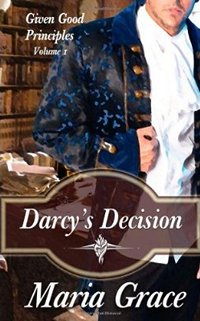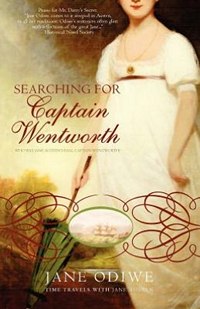From the desk of Sophia Rose: ‘Murder’ and ‘Wickham’ in the same title makes any Jane Austen lover worth their salt sit up and take notice. Now, add that with an author name long associated with young adult sci-fi and fantasy, and that makes Claudia Gray’s The Murder of Mr. Wickham well-nigh irresistible. The Murder... Continue Reading →
Presumption: An Entertainment: A Sequel to Pride and Prejudice, by Julia Barrett – A Review
Before Mr. Darcy’s Little Sister (2010), Miss Darcy Falls in Love (2011), Georgiana Darcy’s Diary (2012) or Loving Miss Darcy (2013), or any of the other numerous Pride and Prejudice sequels elevating Georgiana Darcy to main character, there was Presumption: An Entertainment, by Julia Barrett (1993). Of all of the minor characters in Pride and... Continue Reading →
Return to Longbourn: The Next Chapter in the Continuing Story of Jane Austen’s Pride and Prejudice, by Shannon Winslow – A Review
From the desk of Kimberly Denny-Ryder: Ever since Shannon Winslow debuted with The Darcys of Pemberley (DoP) in 2011, she’s been an Austen fan-fiction author that I’ve kept on my radar. In the two years since she published DoP I’ve not only read everything else she’s written, For Myself Alone (2012) and Mr. Collins’s Last... Continue Reading →
Georgiana and the Wolf: Pride and Prejudice Continues Volume 6, by Marsha Altman – A Review
From the desk of Veronica Ibarra As if reading about the continued lives of our favorite characters from Pride and Prejudice and that of their children is not fascinating enough, send one Georgiana Bingley to seminary in France, throw in a murder with the rumor of a werewolf, and you potentially have something quite interesting.... Continue Reading →
Darcy’s Decision: Given Good Principles Volume 1, by Maria Grace
From the desk of Jeffrey Ward For 200 years, I suspect many enthralled readers of Pride and Prejudice have silently pondered the question “What would Darcy do?” Author Maria Grace endeavors to put her own spin on this with her debut prequel novella Darcy’s Decision, in her Given Good Principles trilogy. Spanning a brief but... Continue Reading →
Sons and Daughters: Darcy and Fitzwilliam Book Two, by Karen Wasylowski – A Review
From the desk of Shelley DeWees Care for a slice of dialogue? I promise that you’ll find it irresistibly juicy, bursting to the seams with wit and character. This is Karen Wasylowski’s work, after all, and you may still have the lingering juices from her first book Darcy and Fitzwilliam on your tongue. It tasted... Continue Reading →
Bewitched, Body and Soul: Miss Elizabeth Bennet, by P. O. Dixon – A Review
From the desk of Kimberly Denny-Ryder With the amount of Jane Austen fan fiction writers that write “what if” variations, you’d think that by now they would be running short on new scenarios. Thankfully, new and imaginative writers keep entering this genre and introduce new variations on our favorite old classic. P.O. Dixon is one... Continue Reading →
Vote for your favorite Pride and Prejudice-inspired book
Poll Which is your favorite Pride and Prejudice-inspired book? We have added 15 popular choices to start the poll off, but please add your favorite so that it can be considered. Cast your vote today! Mr. Darcy's Diary (Jane Austen Heroes, #1) An Assembly Such as This (Fitzwilliam Darcy, Gentleman #1) The Other Mr. Darcy... Continue Reading →
Find Wonder in All Things: Persuasion Revisited, by Karen M. Cox – A Review
From the desk of Christina Boyd: Jane Austen’s most serious and compelling work, Persuasion, is all about retribution, forgiveness and second chances. Her masterpiece begins seven years after the broken engagement between the young heiress, Anne Elliot, and a junior naval officer, Frederick Wentworth—when he is thrown back into her sphere and both must face... Continue Reading →
Hidden Paradise, by Janet Mullany – A Review
From the desk of Christina Boyd. Austenesque and romance writer Janet Mullany dives headfirst into erotica genre in her latest release, Hidden Paradise. Warning: Dear readers, please avert your eyes if your genteel sensibilities are offended by a romance novel that might be classified in the same arena as Fifty Shades of Gray. Disturbingly, the... Continue Reading →
Searching For Captain Wentworth Blog Tour with Author Jane Odiwe
Huzzah! We have a treat for you today. Jane Odiwe, author of Willoughby’s Return and Mr. Darcy’s Secret has just released her new novel, Searching For Captain Wentworth and is sharing an audio extract and insights into its creation. We have had the pleasure of reading this new Regency-era time-travel novel and are so pumped... Continue Reading →
Mr. Darcy’s Refuge Blog Tour with Author Abigail Reynolds & Giveaway
Please help us welcome Austenesque author Abigail Reynolds today during her blog tour in celebration of the release of Mr. Darcy’s Refuge, the ninth novel in her popular Pemberley Variations series. Whenever I read one of her creative and romantic takes on roads not taken in Jane Austen’s Pride and Prejudice, I feel a bit... Continue Reading →











